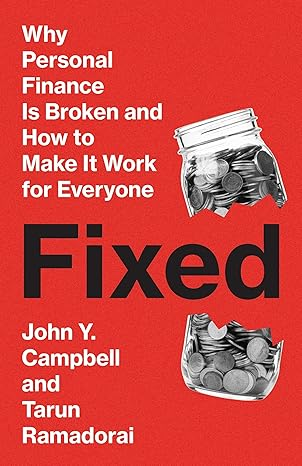
Book Bits: 25 October 2025

By purchasing books through this site, you provide support for The Capital Spectator’s free content… Press) We interact with the financial system every day, whether taking out or paying off loans, making insurance claims, or simply depositing money into our bank accounts… Fixed exposes how th…
 ● Fixed: Why Personal Finance Is Broken and How to Make It Work for Everyone
● Fixed: Why Personal Finance Is Broken and How to Make It Work for Everyone
John Y. Campbell and Tarun Ramadorai
Summary via publisher (Princeton U. Press)
We interact with the financial system every day, whether taking out or paying off loans, making insurance claims, or simply depositing money into our bank accounts. Fixed exposes how this system has been corrupted to serve the interests of financial services providers and their cleverest customers—at the expense of ordinary people. John Campbell and Tarun Ramadorai diagnose the ills of today’s personal finance markets in the United States and across the globe, looking at everything from short-term saving and borrowing to loans for education and housing, financial products for retirement, and insurance. They show how the system is “fixed” to benefit those who are wealthy and more educated while encouraging financial mistakes by those who are aren’t, making it difficult for regular consumers to make sound financial decisions and disadvantaging them in some of the most consequential economic transactions of their lives.
 ● The Investment Philosophers: Financial Lessons from the Great Thinkers
● The Investment Philosophers: Financial Lessons from the Great Thinkers
Ethan A. Everett
Summary via publisher (Columbia U. Press)
What do Warren Buffett and Friedrich Nietzsche have in common? Why does Baruch Spinoza’s understanding of irrational emotions help explain financial markets? How did Voltaire’s success in a bond lottery arbitrage shape his writing? Can David Hume teach an investor when to buck the consensus and when to heed it? Exploring these questions and many others, Ethan A. Everett reveals the surprising lessons we can learn about investing from major philosophers. Demystifying ideas and texts that can often seem intimidating or irrelevant, he shows how philosophical concepts can be fruitfully applied to financial markets. Everett shares how philosophers’ insights have informed his development as an investor, and he considers how great investors have embodied philosophical wisdom in their own endeavors.
 ● The Winner’s Curse: Behavioral Economics Anomalies, Then and Now
● The Winner’s Curse: Behavioral Economics Anomalies, Then and Now
Richard H. Thaler and Alex Imas
Adaptation via Chicago Booth Review
In our new book, The Winner’s Curse: Behavioral Economics Anomalies Then and Now, we revisit a series of anomalies that form the empirical bedrock of behavioral economics. Since anomalies are by definition unexpected findings, they deserve special scrutiny. Indeed, the original “Anomalies” columns published in the Journal of Economic Perspectives, columns on which most of the chapters are based, often highlight the back and forth surrounding early behavioral economics findings and the skeptical replies from traditional economists.
Please note that the links to books above are affiliate links with Amazon.com and James Picerno (a.k.a. The Capital Spectator) earns money if you buy one of the titles listed. Also note that you will not pay extra for a book even though it generates revenue for The Capital Spectator. By purchasing books through this site, you provide support for The Capital Spectator’s free content. Thank you!
Author: James Picerno
